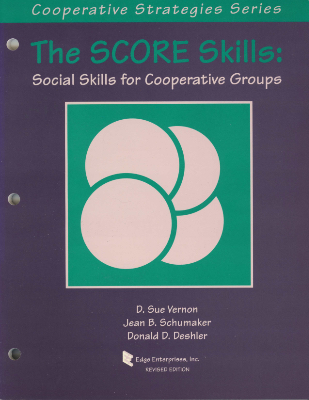Cooperative Thinking: The SCORE Skills

SCORE Skills: Social Skills for Cooperative Groups describes a set of social skills that are fundamental to effective groups. Students learn to share ideas, compliment others, offer help or encouragement, recommend changes nicely, and exercise self-control. The skills can be used to establish and maintain good relationships with others in most everyday situations.
Results showed the mean percentage of cooperative skills used by students in cooperative groups in class before learning SCORE was 25 percent. The mean percentage increased to 78 percent after learning SCORE. Students in a comparison group that had no instruction in SCORE had average scores of 25 percent and 28 percent for the cooperative skills they used in cooperative groups.
Author(s):D. Sue Vernon, Jean B. Schumaker, and Donald D. Deshler
Publication Info: Edge Enterprises, Inc.
Resources:
- Cooperative Thinking Strategies Research Website
- Strategram Vol. 20, No. 4: BUILD Strategy e-Learning Program (pdf)
- Strategram Vol. 13, No. 6: A tactile strategy: THINK Strategy, Framing Routine, SCORE Skills in Braille (pdf)
- Strategram Vol. 12, No. 4: Group Think: LEARN, BUILD, SCORE, THINK Strategies (pdf)
- Strategram Vol. 6, No. 2: The SCORE Skills and the Teamwork Strategy (pdf)
This product is available through Edge Enterprises, Inc.
Please note that professional development, coaching, and infrastructure support are essential components to effective implementation of SIM instructional tools and interventions. It is highly recommended that you work with a SIM professional developer. See the SIM Event list for sessions or email simpd@ku.edu to learn more.